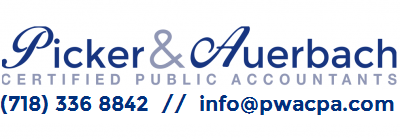
by Zesha Auerbach, CPA
Form 1099 is the form that payors of income use to inform you of the income paid to you. Most of the form 1099s you receive are fairly straightforward. You receive a 1099 from the bank to report interest income paid to you and you receive a 1099 from any stock that pays a dividend to you.
You’ll also receive a form 1099 from anyone who pays you for services that you performed as an independent contractor, and likely does not have taxes taken out (as opposed to a form W-2 that you receive from your employer, which references income in which taxes would have been taken out). These are the 1099s (1099-MISC) that cause the most issues, and many times these issues result in unwanted correspondence from the Internal Revenue Service.
First, it should be noted that you’re responsible to report all of your income whether or not you received a form 1099. So failure to receive a 1099 will not be accepted by the IRS as an excuse for not having reported all of your income. The record-keeping is up to you.
Income from forms 1099-MISC is usually reported on Schedule C of the Form 1040. When the IRS does income matching they will look to see that the income reported on your Schedule C is at least equal to the income that they have in their records based upon the 1099s they have received. The problem arises if you receive a 1099 that over reports your income.
If this should happen the best thing would be to get a corrected 1099 from the payor and have it corrected before the payor reports the income to the IRS. However, many times this will not be possible either because the payor will not cooperate or they have already sent in the 1099s to the IRS.
While it is possible to file a corrected 1099, there is no guarantee that the corrected 1099 will get into the IRS is system and will negate the original incorrect 1099.
In this situation, when the 1099s you received exceed the correct amount of income to be reported, what we recommend is that you report the income that is overstated so that the income will at least match the 1099s received by the IRS. We then recommend taking a deduction for the overage. This deduction should be described in detail as “income erroneously reported on a form 1099”.
Hopefully, this will avoid unnecessary IRS correspondence, but there are no guarantees.
In any event, should you receive IRS correspondence claiming that there is unreported income based upon an erroneous 1099, you should immediately respond with the appropriate explanation and send copies of all relevant documents to back up your position.




